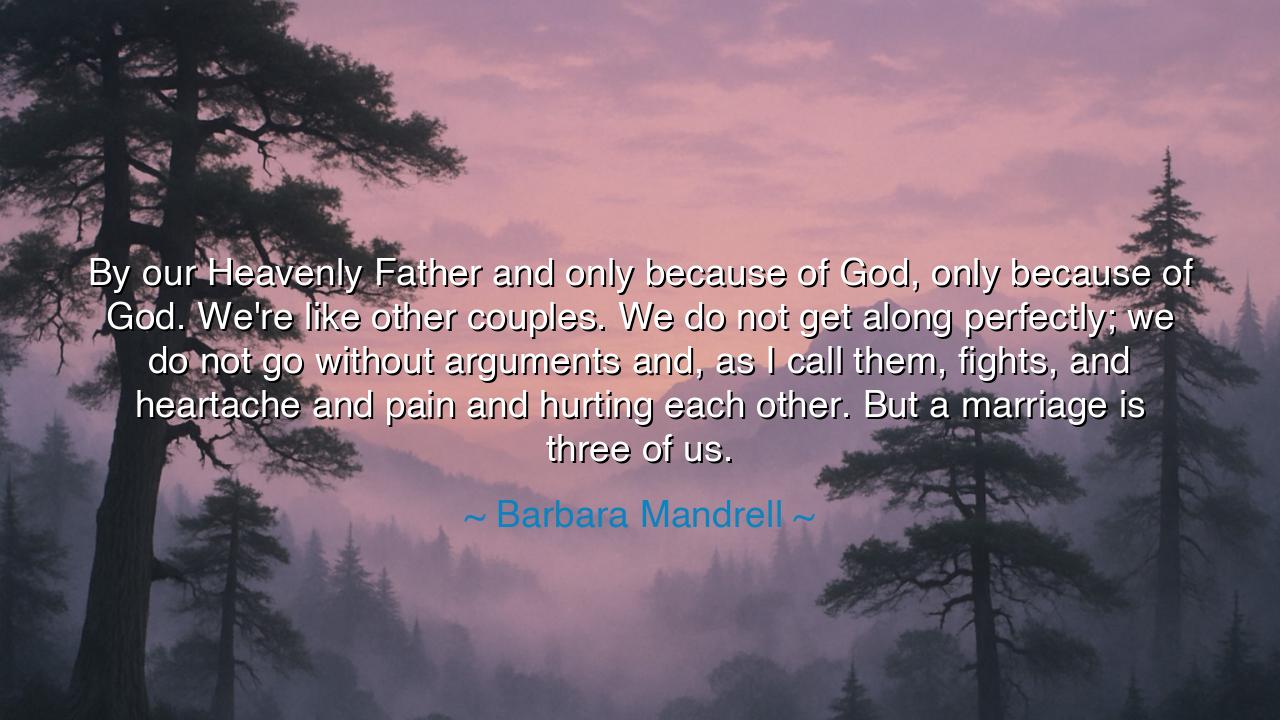
By our Heavenly Father and only because of God, only because of
By our Heavenly Father and only because of God, only because of God. We're like other couples. We do not get along perfectly; we do not go without arguments and, as I call them, fights, and heartache and pain and hurting each other. But a marriage is three of us.






“By our Heavenly Father and only because of God, only because of God. We're like other couples. We do not get along perfectly; we do not go without arguments and, as I call them, fights, and heartache and pain and hurting each other. But a marriage is three of us.” Thus spoke Barbara Mandrell, the singer whose voice once stirred millions, yet whose wisdom here sings of something deeper than music—the melody of faith, love, and endurance. In these words, she lifts the veil on the divine mystery of marriage: that it is not a mere bond between two mortals, but a covenant in which the divine is the unseen third. She reminds us that the foundation of true unity lies not in the perfection of human hearts, but in the presence of God, who binds them when their own strength falters.
Mandrell’s confession is tender and profound. She does not speak of a fairy-tale marriage, but of a real one—marked by misunderstanding, pain, and the ache of human imperfection. Yet even amid the struggle, she finds peace in the knowledge that her marriage stands not upon emotion, but upon faith. “A marriage is three of us,” she says, declaring that the divine presence transforms the fragile love of two people into something sacred and enduring. In this trinity of devotion—husband, wife, and God—each supports the other, each gives meaning to the bond. For where human patience ends, divine grace begins.
The ancients understood this truth well, though they spoke of it in other tongues. In the old scriptures it is written, “A cord of three strands is not easily broken.” So it is with love sanctified by faith. When two hearts join without the third strand of divine presence, their unity may endure for a season, but it is easily frayed by pride, jealousy, or despair. Yet when they invite the eternal to dwell among them, their bond gains a strength that no trial can destroy. The third presence—the spirit of humility, forgiveness, and grace—becomes the healer when they wound one another, the calm when tempests rise, the light that guides them home when both are lost in darkness.
Consider the tale of John and Abigail Adams, whose love endured across oceans and war. Their letters, filled with affection and honesty, reveal not perfection but perseverance. They quarreled, they missed one another, they suffered the sting of pride and distance. Yet through every hardship, they invoked their faith and a sense of divine purpose that transcended their pain. Their marriage was not free of strife, but it was steadfast because it was anchored in something greater than themselves. It was, as Mandrell would say, “a marriage of three.”
Mandrell’s humility shines brightest in her admission that even love cannot banish sorrow or discord. Too often, couples believe that conflict marks the end of affection, or that perfection is proof of harmony. But Mandrell speaks a higher wisdom: that the presence of struggle does not signal failure—it reveals humanity. For love without trial is untested, and faith without hardship is unproven. When she says, “only because of God,” she does not excuse weakness; she glorifies the divine strength that redeems it. The heart learns patience only by enduring, forgiveness only by forgiving, and faith only by trusting when the path is rough.
Her words also carry a quiet warning. Without the third presence—without God—marriage risks becoming a contest of wills rather than a union of souls. Two imperfect beings left to their own pride will sooner or later wound one another beyond repair. But when they remember the divine witness between them, their quarrels soften, their hearts bend rather than break. They learn to see not an adversary but a partner; not an enemy in the argument, but a companion on the journey. The divine does not erase conflict—it redeems it.
So, my listener, take this truth to heart: let your love be strong, but let your faith be stronger still. Whether in marriage, friendship, or family, invite the third presence—call it God, wisdom, or truth—into your relationships. When anger burns, let humility cool it; when pride rises, let prayer humble it; when love grows weary, let faith renew it. Do not seek perfection, for no union of mortals can be perfect. Instead, seek grace, which turns even brokenness into beauty.
For as Barbara Mandrell has taught us, the sacred bond of marriage does not survive because two hearts never fail—it endures because, when they do fail, God stands between them, holding what they cannot hold themselves. And so the union of three—husband, wife, and the divine—becomes not merely a contract, but a living covenant of love. In that trinity lies the secret of endurance, the harmony of imperfection, and the quiet miracle that turns struggle into sanctity.






AAdministratorAdministrator
Welcome, honored guests. Please leave a comment, we will respond soon